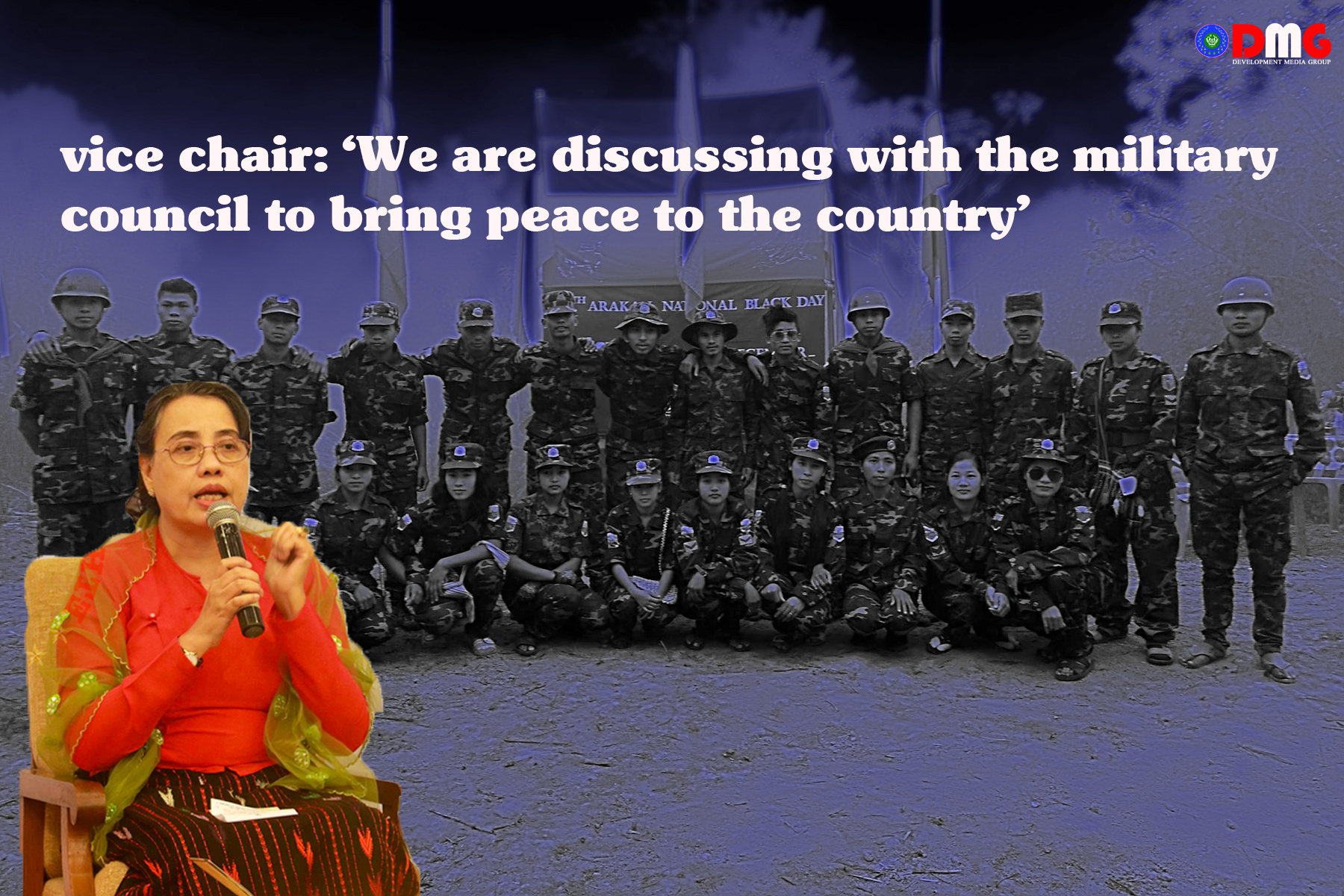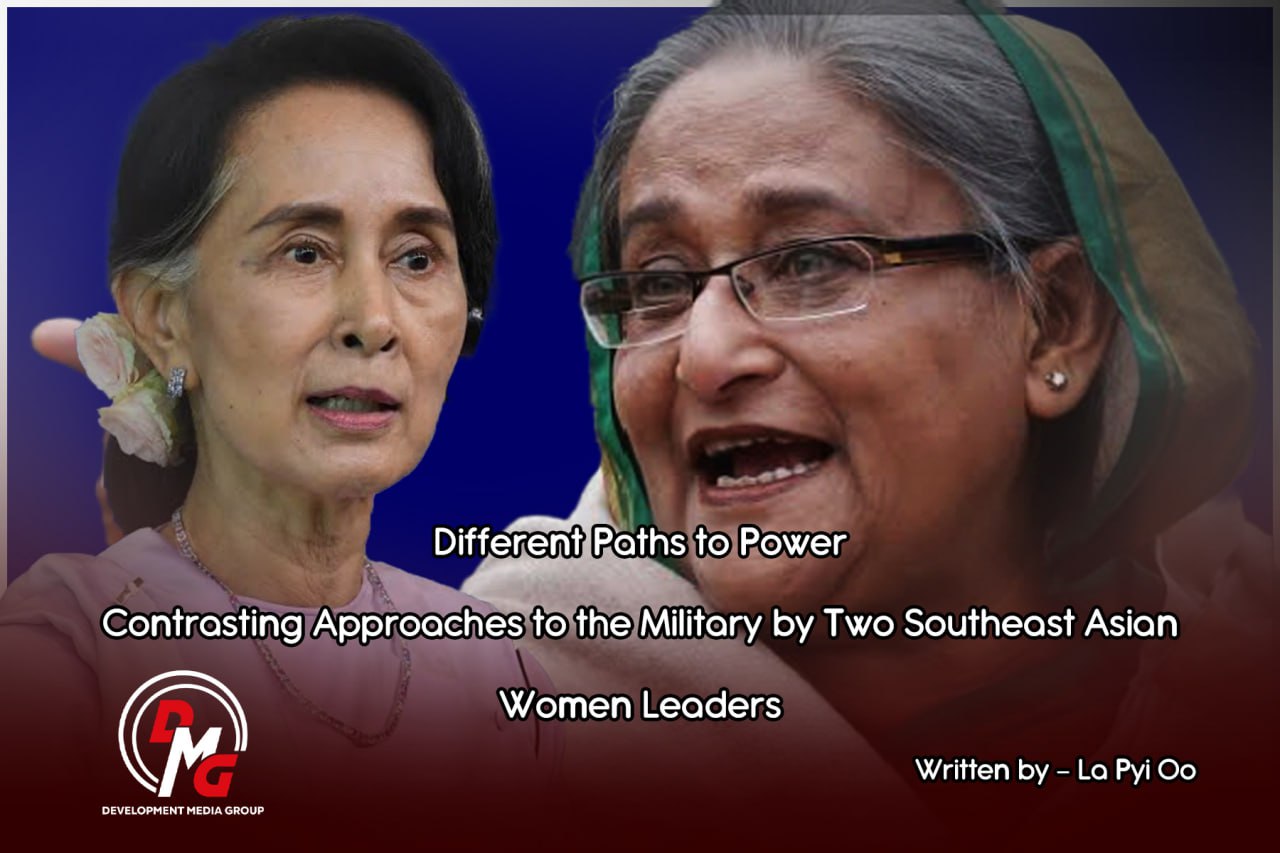ALP vice chair: ‘We are discussing with the military council to bring peace to the country’
The military coup on February 1, 2021, has thrown Myanmar into political chaos, with armed revolution against the junta taking place across much of the country. Tensions are also escalating in western Myanmar’s Arakan State, as the military and the Arakan Army (AA) have returned to armed conflict after more than a year of detente.
06 Oct 2022

The military coup on February 1, 2021, has thrown Myanmar into political chaos, with armed revolution against the junta taking place across much of the country. Tensions are also escalating in western Myanmar’s Arakan State, as the military and the Arakan Army (AA) have returned to armed conflict after more than a year of detente.
At the same time, the regime has been holding peace talks with 10 ethnic armed organisations (EAOs) that appear to have opted out of the fight against the regime. The Arakan Liberation Party/Arakan Liberation Army (ALP/ALA) is one of the EAOs engaged in peace talks with junta chief Min Aung Hlaing.
ALP vice chairperson Saw Mra Razar Linn recently sat down with DMG to talk about the party’s relationship with the State Administration Council (SAC), as Myanmar’s military regime refers to itself.
DMG: What were the results of the peace talks between the ALP and the SAC?
Saw Mra Razar Linn: We have finished the second round of talks with them. At the first round of talks, we only discussed our political objectives. During the second round, they gave us questionnaires and topics for discussions including about what we think should be added to the 2008 Constitution and Union Accord Parts I, II and III.
We didn’t have enough time to compare and so, we could not discuss extensively. They wanted us to draw comparisons and find out the provisions that are the same in essence despite different wording. The SAC said not every provision will fit all the EAOs and told us to focus on the requirements of our own state. Its view is that each state should focus on its own affairs without the involvement of other states. Their question was whether we think the provisions enshrined in the 2008 Constitution mean federalism to us, and if not, what we think should be added to make it federal.
DMG: The ALP has recently held parades and organised training after it was inactive for years, which has aroused the interest of people. What do you want to say to the people?
SMRL: I don’t need to elaborate on the situation of our party. People are already aware of it. I have taken the leadership at a time the party is struggling hard. A party needs to organise a lot of training for its members. Providing one or two training courses is not enough. So, we are organising as many training courses as we can.
People have different views about it. Some are making unfair and uninformed comments. If someone is going to criticise a person or an organisation, I want to ask him or her what they have done, and if they have sacrificed as much as the person who they want to criticise. People may feel that the ALP is in reduced circumstances and not working. But they should acknowledge that the ALP was built out of many years of hard work and has gone through with its promises. Some acknowledge this fact with a sense of humanity. If people are to criticise the party because it is weaker now, it is up to them.
DMG: There arealso suggestions that the ALP might take part in fighting soon. What do youwant to say about that?
SMRL: I have nocomment.
DMG: There were rumours that the SAC had designated territory for the ALP in Thandwe during a recent meeting at the Arakan State government offices. What is your response?
SMRL:We do nothing in Thandwe. It is a baseless accusation.
DMG: How many senior ALP leaders and members has the Arakan Army detained? Is there any negotiation going on with the AA? How is the relationship between the ALP and the AA?
SMRL:There is no negotiation between us. At least 16 ALP members have been seized by the AA. Regarding our relations with the AA, it was said at their recent press conference that they do not accept other Arakanese armed groups in Arakan State. Our party has a long history, and we will try our best to make sure it continues to exist. I don’t want to criticise any [Arakanese organisation]. As I have always said, every organisation striving for Arakan State and Arakanese people should not be enemies, but partners.
DMG: The Arakan Army has reportedly accused ALP leaders of committing crimes. Do you have any comment on this?
SMRL:We have never given permission to commit a crime. The ALP is prohibited from doing anything related to crime. I also deny the AA’s allegation that [ALP executive committee member] Lt. Col. Khaing Paw Lin committed a crime. I would like to say that Lt. Col. Khaing Paw Lin is doing the best he can for the party and Arakan State.
DMG: I would like you to tell me how the ALP is currently progressing toward its revolutionary goals.
SMRL:Since 1967, the ALP has been fighting for independence, and has started an armed revolution. During the 1980s, we cooperated with the National Democratic Forces in the east of the country, and if we were to resolve the Myanmar issue, they began to think of a federalism model rather than fighting for independence. Federalism is the system and methods of governing one’s own country without interfering with other peoples, and other people cannot come and rule it. The ALP leaders decided to sign the NCA [Nationwide Ceasefire Agreement] as they began to think about governing the country with federalism.
States should create self-determination after drafting their own state constitutions. We are calling for federalism with the goal of having three branches of government: executive, judicial and legislative. We are working together with other ethnic armed groups to build a federal union.
DMG: The junta agreed in principle to Wa statehood aspirations and the Mongla Self-Administered Division. What did the ALP request about Arakan State during its meetings with the military junta?
SMRL:The way the military council invites each ethnic armed group and the discussions will be different. The military junta invited us this time to discuss the 2008 Constitution and the Union Accord. When I discussed this matter with Senior-General Min Aung Hlaing, I told him that we are the ones who want to improve the country. I told Senior-General Min Aung Hlaing that we are doing this work because we want to build this country well. We are discussing with the military council to bring peace to the country and a situation where we can talk around a table without bloodshed.
The main reason we were invited to discuss was to compare the Constitution. On our side, when it comes to Arakan State, we will have to draw up our own constitution and governance of the state. When drafting the state constitution, we will see if there is any deviation from the constitution of the union. These will have to be discussed with the stakeholders in Arakan State.
Nowadays, political parties are emerging to take the political stage. The Arakan Army and Arakan National Council/Arakan Army (ANC/AA) have also emerged. All those who are armed with political parties and are fighting for the revolution are working for the good of Arakan State and the Arakanese people. In essence, the life of the people of Arakan and the destiny of Arakan State is to be created by Arakanese people. Therefore, when working on the Arakan State issue, we will have to discuss it with everyone. We will try our best to do this.
DMG: There are also reports that the ALP will be turned into a Border Guard Force by the military council. What do you want to say about this?
SMRL:This news is also false. The issue of turning the ALP into a Border Guard Force has not been discussed with the military council at all. Senior-General Min Aung Hlaing said that he wants the members of the ethnic armed groups to reach the political stage. He said that if some individuals want a position, they can be appointed in various government departments. Senior-General Min Aung Hlaing said that if the ethnic armed groups still want to be armed, they can turn them into police or Border Guard Forces.
If the armed resistance groups cooperate and serve in the government sector, they can serve if they are qualified. He said that ethnic armed groups can serve in the police or army. When we met with Senior-General Min Aung Hlaing, we asked for two political goals and two national goals. In discussing these issues, there are some things that are open. But the last time we met, we had a short time and had to move on to other business, so we were less prepared.
DMG: There is strong criticism of the ALP among a significant segment of the Arakanese community, so if you have anything to add, please do so now.
SMRL:What I want to say to the public is that they should not talk unfairly about the ALP, but think as much as they should. I see a lot of baseless and unjust talk about the ALP.





.jpg)














